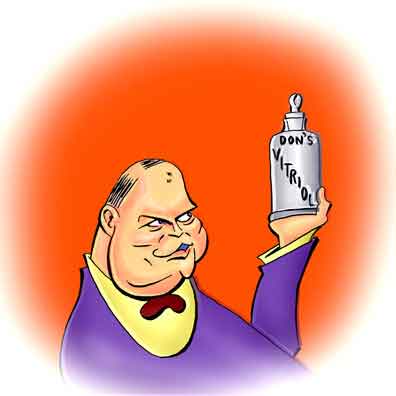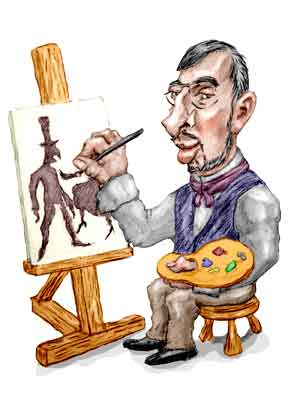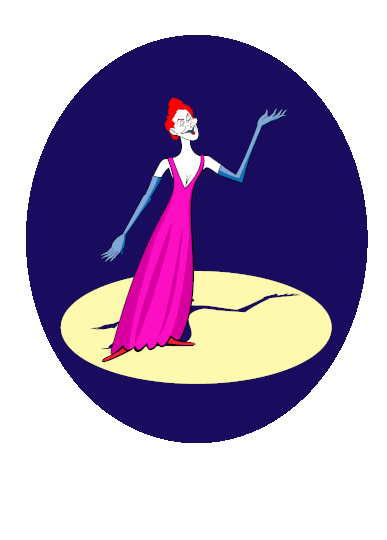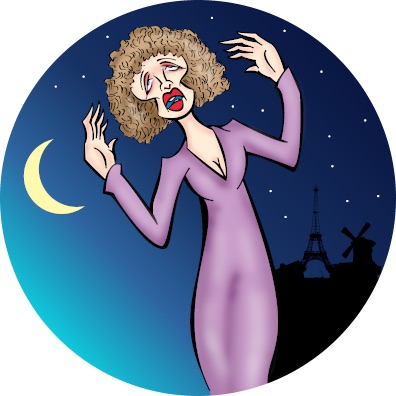As you can see from the lyrics, in the late 1800's Paris, it was cool to be an anarchist.
Hé bien, quoi? (To quote Molière). It was COOL to be an ANARCHIST????!!!!????
Well, it was cool to PRETEND to be an anarchist. Real anarchy would have interfered too much with the night life of Paris in the hot spots like Le Moulin Rouge and Le Chat Noir at the fin de siècle.
For those not of the connaisseurs, the fin de siècle is pronounced something like FAh duh see-AEE-kluh and means literally the end of the century. In common parlance it means, well, it means the end of the century. Specifically it refers to the end of the 19th Century which was at midnight, December 31, 1900.
France had come a long way since the beginning of the century (début de siècle) which started one Planck time unit after midnight, December 31, 1800. You see, France had been a monarchy up to 1792 when it became the first French republic - commensensically called the First French Republic (the French call a shovel and shovel). But then in 1804 the country switched back to being a monarchy whose emperor was a chap named Napoleone Buonaparte (who soon dropped the final "e").
Like a lot of emperors Napoleon decided to fight some wars which he did for over ten years before he was defeated by the Sixth European Coalition in 1814. Realizing he had worn out his welcome in France, he retreated to the island of Elba off the coast of Italy. But realizing there wasn't much future in being an emperor of an island 18 miles long and 11 wide, he returned to Paris in 1815. Then after the Hundred Days (which had ten days to spare) Nappy was finally whupped at Waterloo and exiled to St. Helena.
By then the citoyens of France had decided assez de cette merde! Enough of monarchies! They elected a second republican government (called the Second Republic) but they made a bit of a faux pas when they installed Napoleon's nephew, Charles Louis Napoleon Bonaparte, as President in 1848. Soon Napoleon III, as he was called, found the ponderous workings of a republican government too onerous, and in 1851, declared France was a monarchy once again. Naturally Louis Napoleon was the monarch in charge.
Louis Napoleon did his best to modernize the country. He also worked to improve agricultural production and pushed for the creation (and control) of the Suez Canal. He also came out for the rights working people and even advocated equality for women. So under Louis Napoleon's paternal hand, things went along surprisingly well.
That is, things went along surprisingly well until 1870.
What goobered things up was when the various Germany principalities which were part of a rather loose confederation began to solidify when Otto von Bismark became chancellor of Prussia. Soon the United Germany began arguing with the French about which parts of Europe were Frances's and which were Germany's. Not able to agree, war was declared on July 19, 1870. Officially it was France who had declared war on Germany but that was fine with Germany, thank you.
Being Emperor of France, Louis Napoleon led the troops himself and it took a whole month before the German army took him prisoner. With the Emperor being held captive, it didn't take long for a new government in France to decide they didn't need no emperor. So a new government sans empereur was declared as a third republic and called (what else?) the Third Republic.
Of course, the Germans couldn't care less what type of government France had and the German army reached the outskirts of Paris in September. Despite attempts at negotiations, the city was repeatedly shelled and finally surrendered on January 28, 1871. After the French government agreed to give up its claims to Alsace and other disputed territories, not to mention to pay reparations of five billion francs, Germany then left Paris after the obligatory march through the streets and returned home.
Naturally there was a bit of internal discord left over in France as the politicians decided who to blame. Finally on March 18, the civic leaders of Paris declared an independent government. No, it wasn't called the First Independent Government, but instead it was the Paris Commune. The Paris Commune called for separation of church and state, the end of child labor, a work day limited to 10 hours, and bakers no longer had to work at night.
Sheesh! What a bunch of radicals!
Well, the French national government wasn't having it. On May 21, they sent in the troops, killed about 20,000 of the Communards, and thousands of the survivors were arrested and deported to penal colonies. It was not a good week to be a Revolutionary.
One of the members of the regular French army watching the Commune collapse was the young Louis Armand Aristide Bruand (spelled with a "d"). Depending on who's telling the story, when Aristide's dad died, Aristide moved to Paris or the family moved to Paris and his dad died afterwards. In any case the Bruants (now with a "t") kept moving around so their creditors couldn't find them. The family's frequent moves generally meant they bounced from one cheap apartment to even cheaper apartments.
Despite the family's increasing descent into poverty, Aristide's jobs seemed not too bad, whether it was employment as a clerk, helping a jeweler, or working on the railroads. Personally Aristide was boisterous, loud, and an expert singer.
Aristide was nineteen years old when the Franco-Prussian War broke out, and like many another young men he ended up in the French army. Aristide was no doctrinaire conservative but he retained a basic patriotism to France. And yet having grown up in the poorer sections of town, he remained sympathetic to the poor but had no intention of being poor himself.
During the days of the Commune, Aristide had lived outside of the city. But once order was restored, he returned and again began working for the railroad. What little leisure time he had was spent going to the nightclubs and cabarets. There the customers would sometimes take the stage and soon Aristide's strong vocals became the talk of the Parisian night life.
In the 1880's, Aristide began appearing at what is sometimes considered the first modern cabaret, Le Chat Noir - that is, The Black Cat, which in French as in English has a bit of a double entendre. Aristide sang what are called the chansons réalistes which were songs about and inspired by the lives of the poor and economically depressed Parisians. At Le Chat Noir, Aristide not only had his own act but he also served as host and master of ceremonies. But The Black Cat was actually owned by the impressario Rodolphe Salis and it wasn't long before Aristide decided to go into business for himself.
It didn't take much to start your own cabaret. You simply rented a room, brought in some tables and chairs, made provisions to sell drinks to the customers, and cleared some space for the performers. But sometimes success was slow. When Aristide opened his club, Le Mirliton, only three customers showed up his first night and his take was seven francs. But he went ahead with his act.
Then when he was about to quit for the night, one of the customers demanded he keep singing. Losing his temper, Aristide began shouting at the man and called him an idiot, a wimp, and a lot of other things. The next night the same man returned with some of his friends. But when Aristide didn't insult them, the man called out "What? No bouquets?" Realizing they had come back just to be trashed, Aristide made the vituperations part of his act and so paved the way of the modern insult comic.

The Modern Insult Comic
Aristide began making the whole experience of visiting Le Mirliton one big insult. He made the people stand outside in line rather than just pay the cover charge and come in. When everyone finally got to the tables, their drinks were limited to very bad beer in small glasses (called galopins). After he finished his act with suitable trashing of the bourgeoisie, he'd come down and sit with the customers, order a beer for himself, and put it on their bill.
The audiences were a mixed bunch. Going to the Mirliton for a Friday night became the in-thing for the middle and upper class clerks, bankers, merchants, and businessmen. But you also had the avant-garde writers and artists. Some of these artsy types were also well to do like Gustave Caillebotte and some were even of the "nobility" like Henri Marie-Raymonde de Toulouse-Lautrec-Monfa.

Henry
Henry (as the Anglophilic Henri often spelled his name) had quickly developed a reputation as an excellent painter. He also saw no loss of prestige in venturing into commercial graphic design and he created lithographic posters to advertise acts for the cabarets. The posters became so popular that sometimes they didn't remain up overnight.
Aristide soon struck up a friendship with the young 5'0" artist and would introduce him whenever he saw him in the audience. "Silence, gentlemen," he would announce. "Here's the great painter Toulouse-Lautrec with a friend and some salud I don't know."
Some authors have cited Aristide as the creator of the chansons réalistes but such a claim is difficult to verify as the phrase appears with any regularity only after the fin de siècle. Nowadays the musical genre is associated with the chanteuses like Yvette Guilbert (who often sang at Le Mirliton) and later with Edith Piaf.


Yvette and Edith
Chanteuses
Aristide was one of the few of the late 19th century singers from Montmartre who lived long enough to make some recordings which are still available. But it was Henry who was responsible for much of the modern memory of Aristide. He made a number of posters for Aristide and the true originals can sell for tens of thousands of dollars. Of course, individual posters can sell for a lot more and one of Henry's most famous posters was for the dancer Louise Weber, known professionally as La Goulue. One copy recently sold for over $300,000.
In his later years Aristide retired from performing and wrote a number of song books with the music and lyrics of his chansons. He also wrote a dictionary of French argot or slang. There we learn that during the Belle Époque a friendly way to address a lady that you liked was Bébé (Baby), Poupoule, (Chick), Chaton (Kitten), and Souris (Mouse). Also an elderly lady wearing too much makeup was a vieux tableau (and old painting), and if someone was swimming sans maillot de bain they were swimming sans apprêt (without primer). A man with a big nose had an éteignoir (extinguisher) and if his schnoz was long and red it was an aubergine (eggplant). And of course the popular drink absinthe was known variously as Bavaroise aux choux (Bavarian cabbage), eau de moules (mussel water), bureau arabe (Arabic office), groseille de zouave (soldier's gooseberry), and of course, fée aux yeux verts (the green-eyed fairy)
Aristide's fame reached its peak in the mid-1890's when he was even mentioned in the American newspapers. Perhaps not coincidentally this was also when Le Chat Noir finally closed its doors. That's to be expected since by this time what had been radical and revolutionary - whether it was the impressionists, the post-impressionists, or Aristide and his chansons réalistes - had become old hat.
References and Further Reading
Explosive Acts, David Sweetman, Simon & Schuster, 1999.
Toulouse-Lautrec: A Life, Julia Frey, Weidenfeld and Nicolson, 1994.
"The Eccentric Masculinity of Aristide Bruant", Michael Wilson, The Proceedings of the Western Society for French History, Volume 36, 2008, pp. 195 - 208.
"Collecting Guide: The Posters and Lithographs of Henri de Toulouse-Lautrec", Christie's.
"Poetic Cafes of Paris", Eliot Gregory, Scribner's Magazine, Volume 27, January - June, 1900.
"The Passing of the Black Cat", Birmingham [Alabama] State Herald, April 11, 1897, p. 12.
Choansons et Monologues, Aristide Bruant, Paris, 1889.
Dictionnaire Français-Argot: L'argot au XXe siècle, Aristide Bruant, Paris, 1905.